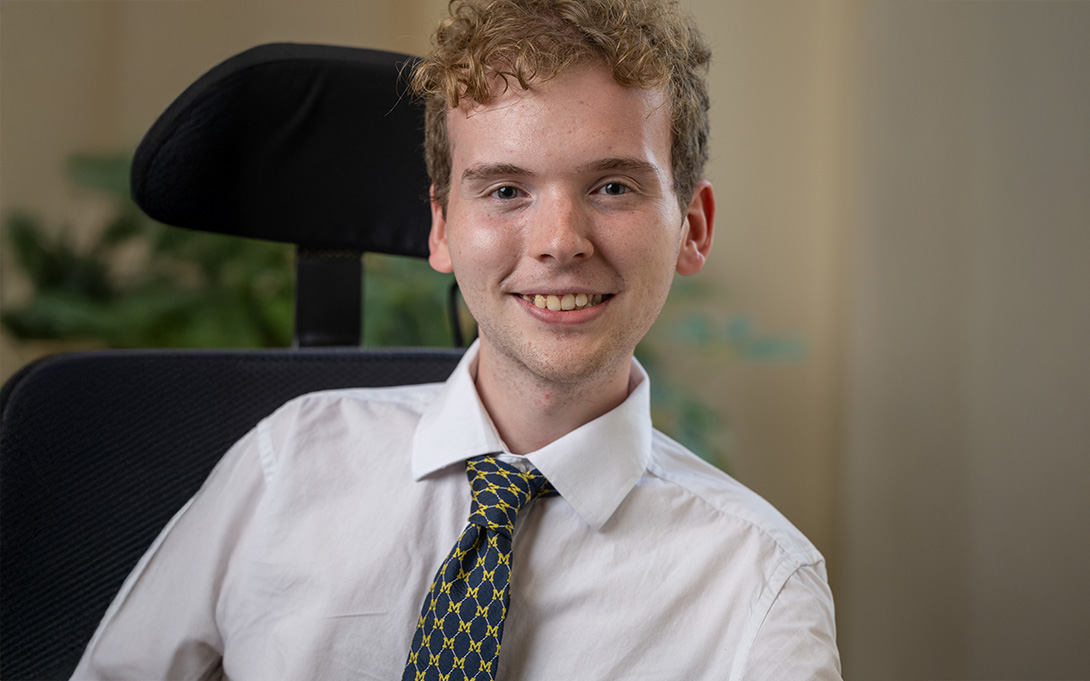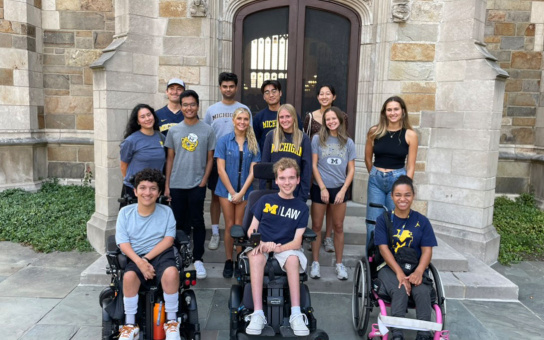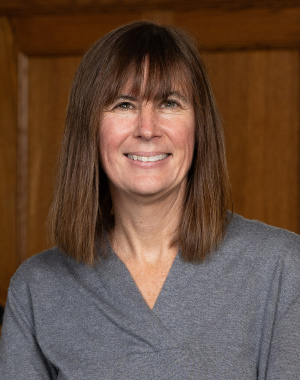
If you ask Vincent Pinti (MPP/JD '27) why he entered the dual degree master’s of public policy and law program at the University of Michigan, he’ll tell you that he didn’t have a choice.
Pinti—who uses a wheelchair due to a genetic condition called spinal-muscular atrophy—spent his undergraduate years advocating for disabled students to receive the care they need to attend college. The experience taught Pinti how much he loved helping others and also that he would need to become a lawyer and policy expert if he wanted to pursue a rewarding career.

That’s because Medicaid, the government health insurance that covers long-term care for the disabled, only provides coverage to people who make less than $20,000 a year. Someone like Pinti would lose their benefits if they earned more. And the out-of-pocket costs for 24-7 care is more than $130,000 a year—expenses not covered by employer-sponsored health insurance.
My whole life’s work—and I’ve got to get on it quickly— is to convince members of Congress and the Michigan state legislature to reform Medicaid to allow people with disabilities to have meaningful lives and careers."
Vincent Pinti
“If you are disabled, you have to hopelessly remain in poverty for the rest of your life,” Pinti says. “My whole life’s work—and I’ve got to get on it quickly—is to convince members of Congress and the Michigan state legislature to reform Medicaid to allow people with disabilities to have meaningful lives and careers.”
It’s an enormous task, says Pamela Herd, the Carol Kakalec Kohn Professor of Social Policy, an expert in disability policy, and one of Pinti’s professors. But if anyone is capable of it, it’s Pinti.
“I have taught in policy schools for 20 years, and I can’t think of another student who’s had the kind of impact that he’s already made,” she says. “He has so much to contribute, but we’ve designed a policy environment that will make it very difficult for him to make those contributions. The fact that he faces these constraints demonstrates that our policy environment is fundamentally flawed.”
Herd’s research focuses on inequality in health care, aging, and the administrative burden of accessing government benefits. She recently published a paper that details how administrative procedures prevent people with disabilities from accessing Medicaid coverage for care.
Problems abound. The rules for coverage vary widely in different states, and there are long waiting lists for care, making it difficult for people with disabilities to move for career opportunities. And we have created what Herd refers to as a “poverty-based” care system.
In a broad sense, we have collectively decided that everyone has a right to live in the community—that they shouldn’t be forced to live in an institution because of their disability,” Herd explains. “But in practice, it’s a completely conditional right that depends on where you live and how well you can navigate the system. Who does and doesn’t get access to care is arbitrary and confusing. These should be actual rights, not conditional rights.”
Pamela Herd
To address this issue, Herd proposes funding long-term care for people with disabilities through Medicare—the federal health insurance for older adults—rather than Medicaid, which is state-sponsored health insurance for low-income individuals. This shift would provide consistent coverage, no matter where someone lives.
A Leap of Faith
Pinti, who grew up in West Virginia, applied to the University of Michigan for his undergraduate studies because he read that the school was ranked as one of the top colleges for students with disabilities. But when Pinti arrived on the Ann Arbor campus in 2019, he had no idea if he would be able to stay.
“I essentially have the physical capacity of a quadriplegic,” Pinti explains. “I can’t walk, stand or lift over a pound or two. I need help to push an elevator button, open a door, get food, and go to the bathroom. But there was no information about how I could get that help, and no one at the university knew what to do.”
Pinti’s father spent the first month sleeping on his dorm room floor to provide care; later, his mom and aunt visited to help. Pinti was so discouraged by the situation, he nearly dropped out. After six months of litigation and appeals through the Michigan Department of Health and Human Services, Pinti secured funding for the round-the-clock care that would allow him to stay at Michigan.

With funding secured, Pinti hired students interested in pursuing health careers to care for him—many of whom have become good friends. His caregivers take shifts staying in his dorm room and accompanying him to class to help with the activities of daily living.
Once he set up his own care, Pinti continued to work with the nonprofit Community Living Centers to secure care for other college students in the state of Michigan. He also set up a network of 70 student caregivers on the Ann Arbor campus. “Students studying health care are an untapped source of caregivers for people with disabilities,” he explains. “This is a great experience for them to understand the lifestyle of a person with a disability—a population they will be working with and supporting for the rest of their careers.”
Outside of class, Pinti also spends time advocating for positive change. Last year, he lobbied the Michigan Legislature to expand the list of income exceptions for people on Medicaid. He also gave a speech and lobbied members of Congress at “Hope on the Hill,” an annual event in Washington, DC, hosted by the nonprofit Cure SMA.
“I talked about why worked-based and private insurance won’t pay for caregiving and solutions in terms of finding other ways to pay caregivers,” Pinti says.
A huge part of being an American is having a career, and right now, people like me are barred from the job market. It’s a bipartisan issue.”
Vincent Pinti
“I am scared and worried for my future,” he says. “But there are many advocates I know will help fight for me, and that makes me believe that anything is possible.”
By Sheri Hall
More in State & Hill
Below, find the full, formatted spring 2025 edition of State & Hill. Click here to return to the spring 2025 S&H homepage.
